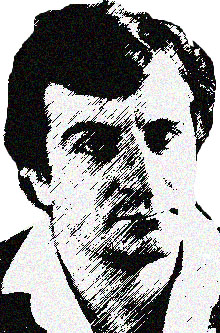
|
 
Douglas Adams: The First and Last Tapes.
By the summer of 1979, the first radio series of The Hitchhiker's Guide to the Galaxy had been broadcast twice on BBC Radio 4 and this extraordinary mixture of science fiction, comedy and intriguingly speculative ideas was slowly becoming a cult hit.
He still needed an income, though, and working as Dr Who's script editor, in a BBC office at White City, had turned out to be more of a compromise than he had hoped. He'd been a fan of the good Doctor since he was 11 and had been keen to make his mark on the show, both by writing (he'd written four episodes) and through his script editing work. In the event, his time spent with Dr Who had left him disillusioned.
'I was told: "We want you, Douglas, because of the specific things you'll be able to bring to the programme," which I have been systematically not been allowed to do.
'This season of Dr Who will look just like any other season – and I feel very disappointed about that.'
'People always make this totally artificial distinction between what is commercial and what is good. They quote that maxim "Nobody ever lost money underestimating the public's taste" and I think that's very wrongheaded. I like to believe the audience is actually intelligent, because it's made up of other people like yourself. 'People don't like to have their intelligence insulted. If you do something with sufficient enthusiasm and put enough into it, people are bound to respond, unless your judgement is totally cock-eyed.' After a lot of disappointments and false starts, Douglas had finally found his voice and his destiny when he stopped trying to follow other people's guidelines and started writing what he himself would have been surprised and delighted to find coming out of his radio. 'I thought "What would I really like to hear? What would excite me? Well, let's write it, because nobody else is doing anything that excites me, apart from the Pythons." 'If The Hitchhiker's Guide to the Galaxy makes money, I shall enjoy that. But what I'll enjoy most is having proved that you don't have to underestimate people. I don't like the notion that you set yourself up as saying "This is what people like, therefore this is what we'll do." That's patronizing.
'I just want to kill the idea that you have to be bland to appeal to your market.'
'I just want to kill the idea that you have to be bland to appeal to your market, though I know a lot of the BBC old guard still regard Hitchhiker's as a momentary aberration, a fluke, and not really what radio comedy ought to be about.
'In the very first episode, while I was writing it, I kept thinking "There ought to be a joke in here, because I've gone three pages without a joke." I knew I was trying to do something different, but you keep on looking for the odd thing you recognise.' Douglas explained the problem with conventional 'jokes' with an example from a scene in the first episode of the radio series, where Arthur Dent comes out with an obvious, punning gag line (Ford: 'How do you feel?' Arthur: 'Like a military academy – bits of me keep passing out.'). That won an immediate laugh from the cast and crew on the first take, but enthusiasm waned after the first few hearings.
At the time of this interview, Douglas had been juggling the day job with writing the first book, editing the first four 30-minute radio episodes to squeeze them onto four 22-minute sides of double LP record, developing ideas for the second radio series and trying to think about the TV version. 'It's been a terrible tussle. All these different media demand the story goes in different directions – and this is getting me into all sorts of problems. When the second series is finished and in the can and I get down to the second book, the plot may actually diverge quite widely from one medium to another. At the moment, the radio show generates the material and then I sit down and try to write a book and make sense of the material.' As Douglas Adams peered ahead in 1979 into the multimedia future he correctly foresaw for his work, he was probably the first major artist to take a full-on multi-channel approach. And he already had an acute sense of the different dynamics of these different media. 'We're doing the telly next year, but I haven't got very far with that yet. We'll start serious thinking about how we're going to do it at the end of this year. It's very important that it looks as extraordinary as it sounded, and it mustn't look like Dr Who or Blake's Seven. All I have is a very vague visual sense about it, in the way that I started out with a vague audio sense about how Hitchhiker's should be. We've got to work that through. 'And I think a film will have to be totally different again. Moving from radio to television, you can take most of the words with you. When you move on to the big screen, you have to start leaving some of the words behind and filling the gap visually, because film is primarily a visual medium. It becomes a different thing. I wasn't certain that could be done until I saw the stage show. 'That was very different. It was fairly ramshackle, because it was put together on no budget at all, very, very fast. It was done by Ken Campbell who is totally wonderful. He's not interested in doing anything that's possible to do – the possible doesn't interest him. The show was 90 minutes long and based on three hours of material, so a lot of the words went, but it still worked. It was a totally different thing from the radio, but it worked very well. So it made me think "We can do this on film."' In fact, of course, the film version saw many false dawns before finally reaching the screen in 2005, four years after Douglas's untimely death. But his original vision of radio, books, records, TV and film, all built round carefully adapted and redeveloped versions of the Hitchhiker's saga, has largely come to pass. The opera and ballet versions are surely on their way, sooner or later. For Douglas, the infinite possibilities and the practical difficulties of getting material written and meeting deadlines sat uncomfortably alongside each other.
'Occasionally, I get a glimpse and think "This can go on for ever." And then I get bogged down on the very next sentence.'
'Occasionally, I get a glimpse and think "This can go on for ever – it'll be terrific." And then I get bogged down on the very next sentence.
'And when the idea comes, I often can't remember where it came from. I remember very little about writing the first series of Hitchhiker's. It's almost as if someone else wrote it.'
Next month:
Douglas's favourite Hitchhiker's bits, why Paul Simon was an inspiration and how to flummox an astrophysicist.
Previous: Editorial | Next: All for One by Steven J. Dines
About the interviewer
You can buy Douglas Adams' books from Amazon.co.uk
Discuss this interview on the Darker Matter Forums
Home | FAQ | Forums | Submissions | Privacy | Contact | Donations 
|
|

 Ian Shircore's career went into precipitous decline after this interview, as he travelled round the world, working in exotic places for The Australian and the South China Morning Post, and ended up as Head of Marketing for an artificial intelligence software company in Cambridge. He has written seven books, on English grammar, management psychology and Internet topics, most of them characterised by appalling timing. They include the somewhat premature Mastering the Internet (1998) and The Complete Idiot's Guide to Online Shopping (2001, the year of the dotcom crash).
Ian Shircore's career went into precipitous decline after this interview, as he travelled round the world, working in exotic places for The Australian and the South China Morning Post, and ended up as Head of Marketing for an artificial intelligence software company in Cambridge. He has written seven books, on English grammar, management psychology and Internet topics, most of them characterised by appalling timing. They include the somewhat premature Mastering the Internet (1998) and The Complete Idiot's Guide to Online Shopping (2001, the year of the dotcom crash).
